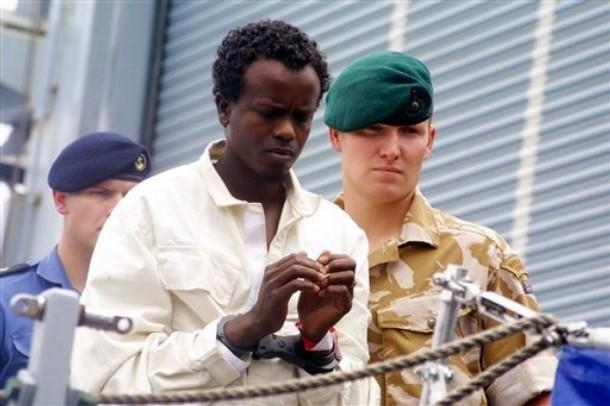As part of its mission Op Atalanta, the European Union Naval Force (EUNAVFOR) is charged with helping to deter, prevent and repress acts of piracy and armed robbery off the coast of Somalia. EUNAVFOR has to date transferred 9 groups of suspected pirates totalling 75 individuals to the Kenyan authorities for prosecution.
Handover of suspected pirates to the Kenyan authorities takes place in Mombasa. The suspected pirates will arrive, either by sea or air, in Mombasa where Kenyan police and state prosecutors will be presented the proposed case for prosecution. Having reviewed the evidence and, assuming that the Kenyan prosecutors consider the case is suitable for prosecution, the suspected persons will then be arrested by the local authorities.
Kenyan law requires that the accused persons appear before a magistrate within 24 hours of arrest by the Kenyan police. Trials typically commence eight to ten weeks later.
Prosecutions are conducted by Kenyan Prosecutors under Kenyan Law before a single magistrate. EUNAVFOR officers work closely with Kenyan prosecutors, ensuring the attendance of witnesses, both military and civilian, from many different nations and assisting in evidence gathering and preparation of the prosecution case.
The maximum sentence upon conviction for piracy offences in Kenya is life imprisonment; under Kenyan Law – and indeed as a precondition for suspected pirates being transferred by EUNAVFOR – capital punishment is not available.
Cases are conducted in English, however, a Somali language interpreter is present at all proceedings. Given the international nature of piracy offences, other interpreters may also be present to allow witnesses to give evidence.
In all cases the accused persons have had the benefit of professional legal representation. Although the Kenyan legal system does not provide for legal aid in piracy cases, the United Nations Office on Drugs and Crime (UNODC) has funded defence representation through independent legal advice organisations such as the East Africa Peace Institute Trust and Kituo Cha Sharia.
While the accused person’s trial is ongoing, they will be held at Shimo la Tewa Prison, 20 km North of Mombasa. Facilities at Shimo La Tewa have improved significantly as part of the European Commission and UNODC’s joint programme to enhance criminal justice capacity in Kenya and other nations in the region. Improvements at Shimo la Tewa include improvements in sanitation and water supply, the development of a welfare service to provide prisoners with basic necessities, the provision of educational and sports equipment, improvements in medical care and the reconstruction of the prison kitchen. The programme has also seen substantial investment in both training and facilities at other Kenyan prisons, as well as for the Kenyan Police, Prosecutors and Court System, including the rebuilding of the court house at Shimo La Tewa.
Judgment in the first EUNAVFOR case is due to be delivered on 27 August 2010, with a number of other judgments expected in the weeks thereafter.
Handover of suspected pirates to the Kenyan authorities takes place in Mombasa. The suspected pirates will arrive, either by sea or air, in Mombasa where Kenyan police and state prosecutors will be presented the proposed case for prosecution. Having reviewed the evidence and, assuming that the Kenyan prosecutors consider the case is suitable for prosecution, the suspected persons will then be arrested by the local authorities.
Kenyan law requires that the accused persons appear before a magistrate within 24 hours of arrest by the Kenyan police. Trials typically commence eight to ten weeks later.
Prosecutions are conducted by Kenyan Prosecutors under Kenyan Law before a single magistrate. EUNAVFOR officers work closely with Kenyan prosecutors, ensuring the attendance of witnesses, both military and civilian, from many different nations and assisting in evidence gathering and preparation of the prosecution case.
The maximum sentence upon conviction for piracy offences in Kenya is life imprisonment; under Kenyan Law – and indeed as a precondition for suspected pirates being transferred by EUNAVFOR – capital punishment is not available.
Cases are conducted in English, however, a Somali language interpreter is present at all proceedings. Given the international nature of piracy offences, other interpreters may also be present to allow witnesses to give evidence.
In all cases the accused persons have had the benefit of professional legal representation. Although the Kenyan legal system does not provide for legal aid in piracy cases, the United Nations Office on Drugs and Crime (UNODC) has funded defence representation through independent legal advice organisations such as the East Africa Peace Institute Trust and Kituo Cha Sharia.
While the accused person’s trial is ongoing, they will be held at Shimo la Tewa Prison, 20 km North of Mombasa. Facilities at Shimo La Tewa have improved significantly as part of the European Commission and UNODC’s joint programme to enhance criminal justice capacity in Kenya and other nations in the region. Improvements at Shimo la Tewa include improvements in sanitation and water supply, the development of a welfare service to provide prisoners with basic necessities, the provision of educational and sports equipment, improvements in medical care and the reconstruction of the prison kitchen. The programme has also seen substantial investment in both training and facilities at other Kenyan prisons, as well as for the Kenyan Police, Prosecutors and Court System, including the rebuilding of the court house at Shimo La Tewa.
Judgment in the first EUNAVFOR case is due to be delivered on 27 August 2010, with a number of other judgments expected in the weeks thereafter.
